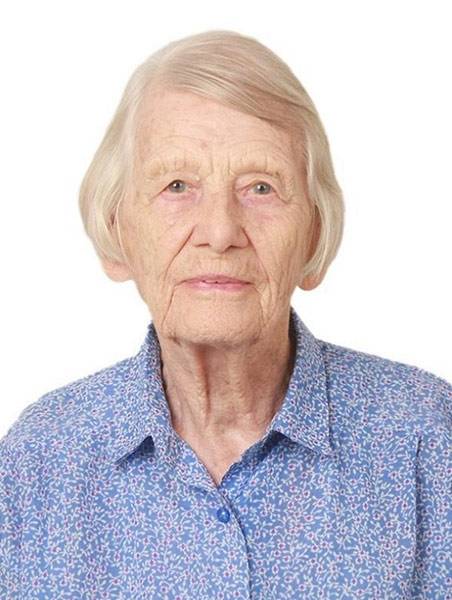(单词翻译:单击)
正文文本
"Yes, I just like to say I'm very happy about these birthday greetings being given to me. That's very friendly and warm, and good friends."
Isabel Crook appreciated the warm greetings from her family, students and friends at her 103rd birthday in Beijing. Now 104 years old, she is a witness to the founding of the People's Republic of China. She remembers the historic moment when the People's Liberation Army entered Beijing.
"We looked all down the street and it was heads of people, students, lots of students all with red triangular flags. They were waving and came along the incoming army and then came the incoming cavalry which is very exciting. It is the most joyful I think I've ever watched."
Isabel was born to a missionary couple in Chengdu in 1915 and spent most of her childhood there before going to Canada for higher education. In the 1940s the anthropologist and her husband returned to China. The couple went to Shilidian, a village in Hebei province controlled by the communists, where a massive campaign of land reform was taking place.
Isabel says she believed the revolutionary movement would reshape the future of the impoverished rural areas. She decided to stay there and did field work on rural studies, which then became valuable documents with vivid accounts of the real lives of rural households, recording the dramatic change in the vast rural places.
"The land reform was obviously going to change the whole future of China's history, because it will get rid of China's feudal system and left the old ways of doing things. Because they put the working people the farmers in power, rather than going on the old way."
The Crook couple wrote a book named Revolution in a Chinese Village: Ten Mile Inn, which was then published in London in 1959 and 20 years later in New York. The book introduced the unpecedented social reform in China to the rest of the world.
"And one of my reasons to study the land reform was to be able to write the book that could help the Indians and help other colonial people learn from China."

When Isabel finished her field work and was about to leave China she received a letter from Yie Jianying, a prominent army chief and headmaster of a military academy. The letter came as a surprise to the couple and changed their lives ever after in a way they didn't expect.
"It was around Christmas time, I think. Wang Bingnan came and asked us to stay because China was soon going to win the liberation war and will set up People's republic of China and we need to have a foreign ministry with diplomats who are able to speak and have good command of English."
Isabel and her husband decided to stay and worked as teachers in a foreign study school in Hebei Province, which then morphed into one of China's top foreign language universities. Their passion for teaching lasted decades and cultivated a lot of young talents with expertise in foreign languages. In 1974, Isabel returned to Canada to visit her parents, and many of her friends and colleagues believed she would settle down in her hometown. But to everyone's surprise, Isabel returned to China after only a short stay in Canada.
"So much of our life was spent here on the campus. Here, Beiwai (Beijing Foreign Studies University) and our friends were here, our close friends, and also friends among the foreignes in Beiwai and other places. So our friends over here are thirty years. We are close friends and we are right here in Beijing. And then our Chinese friends our fellow teachers, the people we cared most are here in Beijing. China was the first home. Canada was the second home."
Ever since then, Isabel has stayed in China and devoted the rest her life to teaching and education reform. Her efforts helped transform her school — a language college — into a university with multiple disciplines. Former Beijing Foreign Studies University Vice President Hu Wenzhong was one of her prominent students and a close friends with whom she worked with to press ahead reforms in education. Hu says he's impressed by his teacher's courage to go against the tide and make a difference.
"They have independent views on teaching. They were really courageous in terms of pressing ahead reforms. They had audacious ideas and are dauntless to make a change. They never held back their opinion nor hesitated to put their words into action or follow the crowd. We've been friends for over 50 years. For me they are great teachers and friends and role models as well. They influenced my entire life."
Isabel and other awardees of the Friendship Medals not only witnessed the shift of the fortune of China, but also contributed their passion, love and expertise to the modernization of the country, which won them wide admiration from the public and the highest honor of the country.
For CRI, this is Guo Yan.
参考译文
“我想说,我对生日祝福感到非常高兴。非常友好、热情,他们是好朋友。”
伊莎白·柯鲁克感谢她的家人、学生和朋友来到北京为她庆祝103岁的生日。她现年104岁,是中华人民共和国成立的见证人,她还记得中国人民解放军进入北京的历史性时刻。
“我们在街上四处张望,人潮涌动,很多学生都拿着三角红旗。他们挥舞着红旗,然后军队沿街走来,然后骑兵也来了,这非常令人兴奋。这是我见过的最令人高兴的场景。”
伊莎白的父母是一对传教士夫妇,她于1915年在成都出生,童年的大部分时间都在成都度过,之后她赴加拿大接受高等教育。20世纪40年代,这位人类学家和她的丈夫回到中国。夫妻二人前往共产党根据地河北省十里店村,当时那里正在进行大规模的土地改革运动。
伊莎白表示,她相信革命运动将重塑贫困农村地区的未来。她决定留在那里进行农村研究的田野调查,这些研究资料之后成为了生动描述农村家庭真实生活的宝贵文件,记录了广大农村地区发生的戏剧性变化。
“土地改革显然将改变中国历史的整个未来,因为它将摆脱中国的封建制度,摆脱旧的行为方式。因为他们让劳动人民和农民做主人,而不是走上老路。”
这对夫妇写了一本书,名为《十里店――中国一个村庄的革命》,该书于1959年在伦敦出版,20年后在纽约出版。这本书向世界其他地方介绍了中国开展的史无前例的社会改革。
“我研究土地改革的原因之一是为了能写这本书,以此来帮助印第安人和其他殖民地人民学习中国的经验。”
伊莎白完成田野调查并准备离开中国时,她收到了著名陆军参谋长兼军事学院校长叶剑英的信。这封信令这对夫妇感到惊讶,并以他们意想不到的方式改变了他们的生活。
“那是圣诞节前后。王炳南来找我们,希望我们能留下来,因为中国将在不久之后赢得解放战争,并建立中华人民共和国,同时成立外交部,外交官需要能够讲英语并很好地掌握英语。”
伊莎白和丈夫决定留下来,二人在河北省一所外国学习学校任教,该学校后来成为中国顶尖的外国语大学之一。他们的教学热情持续了数十年,培养了许多具有外语专业知识的年轻人才。1974年,伊莎白回到加拿大探望父母,她的许多朋友和同事认为她会在自已的家乡定居。但令所有人惊讶的是,伊莎白在加拿大短暂停留后就回到了中国。
“我们一生的大部分时间都在这所校园度过。北外这里有我们的朋友,有包括外国友人在内的密友。我们这里的朋友在一起已经有30多年了。我们是最亲密的朋友,我们都在北京生活。还有我们的中国朋友、我们的教师伙伴,我们最关心的人大多数都在北京。中国是第一故乡。加拿大是第二故乡。”
从那时起,伊莎白就一直留在中国,并将余生致力于教学和教育改革事业。她努力将她所在的语言类大学转变成一所多学科大学。前北京外国语大学副校长胡文仲是她的杰出学生之一,同时也是她的密友,与她一起推动了教育改革。胡文仲表示,老师那勇于逆势而有所作为的勇气给他留下了深刻的印象。
“他们在教学方面有自已独立的观点。在推进改革方面,他们真的很勇敢。他们有大胆的想法,不畏艰险地做出改变。他们从不隐藏意见,也毫不犹豫地将自已的言论付诸实践,不会人云亦云。我们成为朋友已经超过50年了。对我来说,他们是伟大的老师、朋友和榜样。他们影响了我的整个人生。”
伊莎白和其他友谊勋章获得者不仅见证了中国命运的转变,也为中国的现代化建设贡献了自已的热情、爱心和专业知识,赢得了公众的广泛赞誉和国家的最高荣誉。
CRI新闻,郭彦(音译)报道。
重点讲解
重点讲解:
1. get rid of 摆脱;甩掉;赶走;
"We're the people who are looking for and trying to get rid of any barriers to education, " she said.
她说,“我们就是这样的人,寻找并试图摆脱任何妨碍教育的障碍。”
2. morph into 改变;变化;
It was like watching him morph into an adult right before my eyes.
这感觉就像是我眼瞅着他在我面前长大成人。
3. settle down 定居,安顿下来;
I have decided to settle down in the country.
我决定在这个国家定居。
4. go aginst 违背;违反;
Those who go against the trend of history will be cast aside by the people.
逆历史潮流而动的人终将被人民所唾弃。


